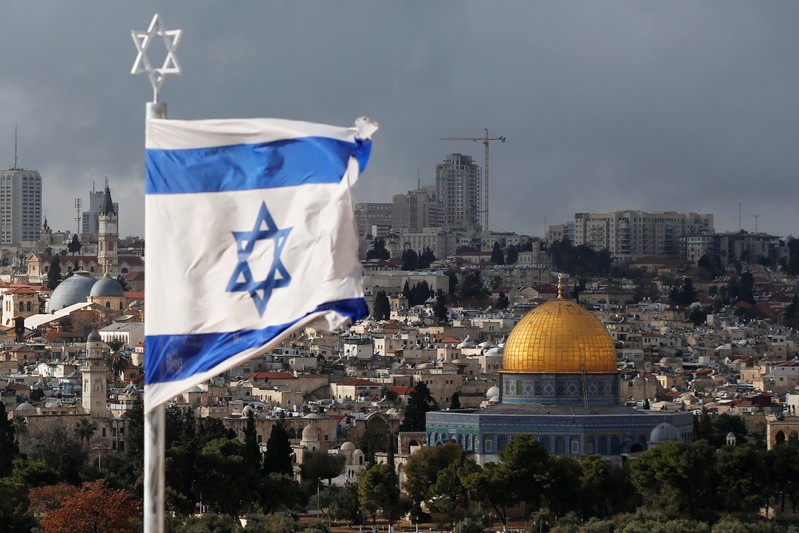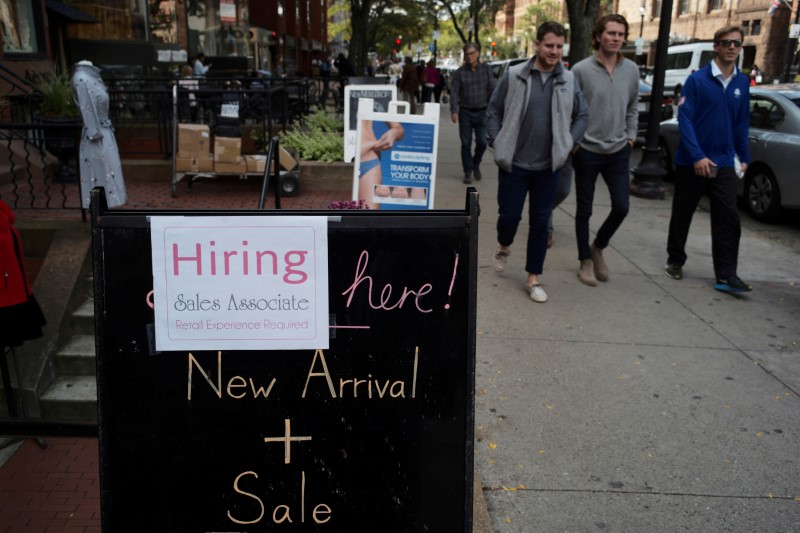
An Israeli flag is seen near the Dome of the Rock, located in Jerusalem’s Old City on the compound known to Muslims as Noble Sanctuary and to Jews as Temple Mount December 6, 2017. REUTERS/Ammar Awad
December 6, 2017
By Steve Holland and Miriam Berger
WASHINGTON/JERUSALEM (Reuters) – President Donald Trump will announce on Wednesday that the United States recognizes Jerusalem as the capital of Israel and will move its embassy there, breaking with longtime U.S. policy and potentially threatening regional stability.
Despite warnings from Western and Arab allies, Trump in a 1 p.m. (1800 GMT) White House speech will direct the State Department to begin looking for a site for an embassy in Jerusalem as part of what is expected to be a years-long process of relocating diplomatic operations from Tel Aviv.
Jerusalem’s status has been a stumbling block in decades of on-off Israeli-Palestinian peace efforts. Israel considers the city its eternal and indivisible capital and wants all embassies to be based there. But Palestinians want the capital of an independent Palestinian state in the east of the city.
Washington’s Middle East allies have all warned against the dangerous repercussions of his decision.
Pope Francis called for Jerusalem’s “status quo” to be respected, saying new tension in the Middle East would further inflame world conflicts. China and Russia expressed concern that the plans could aggravate regional hostilities.
Trump will sign a national security waiver delaying a physical move since the United States does not have an embassy structure in Jerusalem to move into. A senior administration official said it could take three to four years to build one.
But Trump’s decision, a core promise of his campaign last year, will upend decades of American policy that has seen the status of Jerusalem as part of a two-state solution for Israelis and Palestinians.
Israeli Prime Minister Benjamin Netanyahu did not comment on Wednesday on the planned move. Israeli Justice Minister Ayelet Shaked said Israelis should “wait and see” what happens with Trump’s announcement.
The Palestinians have said Trump’s move would mean the “kiss of death” to the two-state solution.
“He is declaring war in the Middle East, he is declaring war against 1.5 billion Muslims (and) hundreds of millions of Christians that are not going to accept the holy shrines to be totally under the hegemony of Israel,” Manuel Hassassian, the chief Palestinian representative to Britain, told BBC radio.
Senior Trump administration officials said Trump’s decision was not intended to tip the scale in Israel’s favor and that agreeing on the final status of Jerusalem would remain a central part of any peace deal between Israel and the Palestinians.
In defending the decision, the officials said Trump was basically reflecting a fundamental truth: that Jerusalem is the seat of the Israeli government and should be recognized as such.
“The president believes this is a recognition of reality,” said one official, who briefed reporters on Tuesday about the announcement. “We’re going forward on the basis of a truth that is undeniable. It’s just a fact.”
“NEW ADVENTURISM”
Israel captured Arab East Jerusalem in the 1967 Middle East war and later annexed it. The international community does not recognize Israeli sovereignty over the entire city, home to sites holy to the Muslim, Jewish and Christian religions.
No other country has its embassy in Jerusalem.
The political benefits for Trump of the move are unclear. The decision will thrill Republican conservatives and evangelical Christians who make up a large share of his political base.
But it will complicate Trump’s desire for a more stable Middle East and Israel-Palestinian peace and arouse tensions. Past presidents have put off such a move.
Iranian Supreme Leader Ayatollah Ali Khamenei said the plans were a sign of U.S. “incompetence and failure”, while Iranian President Hassan Rouhani said there was “no place for new adventurism by global oppressors”, according to Mizan, the news site for the Iranian judiciary.
Iran has long supported a number of Palestinian militant groups opposed to Israel.
Islamist militant groups such as al Qaeda, Hamas and Hezbollah have in the past tried to exploit Muslim sensitivities over Jerusalem to stoke anti-Israel and anti-U.S. sentiment.
“Our Palestinian people everywhere will not allow this conspiracy to pass, and their options are open in defending their land and their sacred places,” said Hamas chief Ismail Haniyeh.
Germany and France warned its citizens in Israel and the Palestinian Territories of the risk of unrest.
‘SERIOUS IMPLICATIONS’
The decision comes as Trump’s senior adviser and son-in-law, Jared Kushner, leads a relatively quiet effort to restart long-stalled peace efforts in the region, with little in the way of tangible progress thus far.
“The president will reiterate how committed he is to peace. While we understand how some parties might react, we are still working on our plan which is not yet ready. We have time to get it right and see how people feel after this news is processed over the next period of time,” one senior official said.
As well as Netanyahu, Trump spoke to Palestinian President Mahmoud Abbas, Jordan’s King Abdullah and Saudi King Salman to inform them of his decision.
The Jordanian king “affirmed that the decision will have serious implications that will undermine efforts to resume the peace process and will provoke Muslims and Christians alike,” said a statement from his office.
Abbas warned Trump of the “dangerous consequences” that moving the embassy would have for peace efforts and regional stability, Abbas spokesman Nabil Abu Rdainah said.
But Trump assured Abbas that he remained committed to facilitating an Israeli-Palestinian peace deal, one U.S. official said.
United Nations spokesman Stephane Dujarric told reporters it regarded Jerusalem as a “final-status issue that must be resolved through direct negotiations between the two parties based on relevant Security Council resolutions.”
Trump has weighted U.S. policy toward Israel since taking office in January, considering the Jewish state a strong ally in a volatile part of the world.
But deliberations over the status of Jerusalem were tense. Vice President Mike Pence and David Friedman, U.S. Ambassador to Israel, pushed hard for both recognition and embassy relocation, while Secretary of State Rex Tillerson and Defense Secretary Jim Mattis opposed the move from Tel Aviv, according to other U.S. officials who spoke on condition of anonymity.
An impatient Trump finally weighed in, telling aides last week he wanted to keep his campaign promise.
(Additional reporting by Roberta Rampton, Matt Spetalnick and John Walcott in Washington and Michelle Nichols at the United Nations, Michael Nienaber in Berlin, Costas Pitas in London, Philip Pullella in Vatican City, Babak Dehghanpisheh in Beirut, Dmitry Solovyov in Moscow; Editing by Janet Lawrence)

